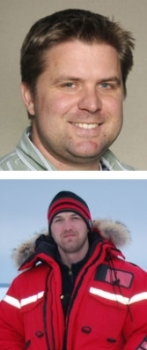Nov 16 2013
Two scientists from the University of Waterloo have been named Canada Research Chairs by the Government of Canada for their work in quantum physics.
 Kevin Resch (Top) and Roger Melko
Kevin Resch (Top) and Roger Melko
Kevin Resch and Roger Melko from Waterloo’s Department of Physics and Astronomy are awarded Tier 2 Canada Research Chairs. The appointments bring $1 million to Waterloo and promote cutting-edge research that will strengthen Canada’s international competitiveness.
“Quantum research is a strategic priority for the University of Waterloo and the research happening here has the potential for global impact,” says Feridun Hamdullahpur, president and vice-chancellor of Waterloo. “These two researchers add to our world-class complement of quantum researchers and their work will shape today’s technology and the technology of the future.”
Kevin Resch holds the Canada Research Chair in Optical Quantum Technologies. A member of Waterloo’s Institute for Quantum Computing, Resch’s work focuses on generating new quantum states of light with applications ranging from quantum computing to future medical imaging instruments.
Kevin Resch and Roger MelkoKevin Resch (Top) and Roger Melko
Roger Melko holds the Canada Research Chair in Computational Quantum Many-Body Physics. An affiliate member of the Institute for Quantum Computing and associate faculty member of the Perimeter Institute for Theoretical Physics, Melko’s research uses state-of-the-art tools and computer simulations to model novel quantum systems that will be the foundation for future materials, devices and information systems.
“Kevin and Roger’s discoveries have the potential to turn today’s impossibilities into tomorrow’s reality,” says Terry McMahon, Dean of Science. “Their appointments are a great source of pride for this Faculty and reiterate our leadership in physics and quantum information research.”
The Canada Research Chairs program is at the centre of a national strategy to make Canada a global leader in research and development. Each year the program invests nearly $300 million to attract and retain some of the world’s most accomplished and promising minds. Chairholders are recognized for research excellence in engineering and the natural sciences, health sciences, humanities, and social sciences.
“Our government remains committed to attracting and retaining the world’s best researchers, creating jobs and strengthening our economy,” said Minister of State Rickford. “Through programs such as the Canada Research Chairs, we are supporting cutting-edge research at Canadian universities and fostering innovation by helping researchers bring their ideas to the marketplace, to benefit Canadians and improve our quality of life.”
About the University of Waterloo
In just half a century, the University of Waterloo, located at the heart of Canada's technology hub, has become one of Canada's leading comprehensive universities with 35,000 full- and part-time students in undergraduate and graduate programs. Waterloo, as home to the world's largest post-secondary co-operative education program, embraces its connections to the world and encourages enterprising partnerships in learning, research and discovery. In the next decade, the university is committed to building a better future for Canada and the world by championing innovation and collaboration to create solutions relevant to the needs of today and tomorrow. For more information about Waterloo, please visit www.uwaterloo.ca.